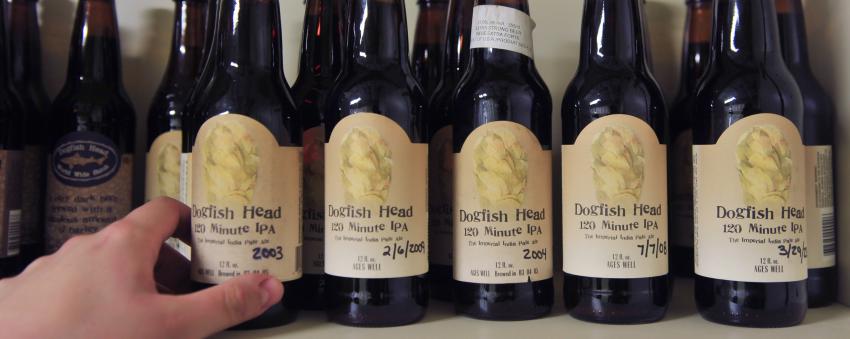
5 things you should know about aging beer
Aging beer is a little like enjoying music. Some folks are forever chasing the latest releases, while others stick to the classics. There are live-music junkies fueled by the fervor of a crowd, and there are audiophiles who rarely come out from under their hi-fi headphones. Some like bass, some like treble. Tomato, to-mah-to and everything in between.
Beer offers just as much nuance, even when the labels look exactly the same. An Immort Ale from 2002 tastes different than one fresh off the bottling line. Which one is better? That depends.
120 Minute IPA, Olde School and Immort Ale are all great candidates for aging.
"It's like your stereo system," says former Dogfish Head Quality Control Manager Rebecca Newman. "If you like it really tinny and not very bass-y, you adjust that. Think of beer coming out of the brewery as really tinny, really sharp, really crisp. Over time, those bass notes – those bigger, fuller, sweeter, malty flavors – come up, and a lot of the sharpness is diminished. So, what do you like: bass or treble?"
While there are no hard-and-fast rules to aging beers, it helps to keep a few things in mind.
1. A little experimentation goes a long way.
Taste, of course, is subjective, and the things that happen inside a bottle of beer are more alchemy than exact science. If you're curious about how a beer ages, buy a few bottles, drink one fresh, and stash the rest. Try another six months down the road.
Do you like the direction the beer is taking? Are the flavors you liked the first time around becoming more pronounced, or are they fading away? If you're happy with the evolution, try another in six months and ask yourself the same questions. If you're not happy, grab a few friends and finish off the bunch.
2. Don't underestimate fresh.
Depending on the beer you age, you'll notice some flavors fading into the background and others becoming more pronounced. Several things influence those changes, but the main driver is oxygen.
"There's always very slow oxidation," says Rebecca. "If you're a really good brewer and you've worked hard to get the oxygen out, then your beer will age very gracefully and slowly. If you haven't spent the time and the effort to get the oxygen out at the time of packaging, then you lose those beautiful flavors very rapidly."
Hops – whether bitter, floral or citrusy – fade with time, so IPAs and other hop-forward beers aren't great candidates for aging. That said, Dogfish Head 120 Minute IPA only gets better with age. A year or two on the holy grail for hopheads brings out deliciously sweet sherry and marmalade notes. (See – we told you there are no hard-and-fast rules!)
Seasonals, which often take advantage of freshly harvested ingredients, and fruit beers are usually best young, as well.
“Beers like Black & Blue, Red & White and Festina Peche have these incredible fruit additions,” Rebecca says, “and we want those bright notes to come forward.”
3. High-alcohol beers tend to age better.
While there are exceptions, we recommend aging beers that clock in at 10% ABV and up.
"Typically," says Rebecca, "there's some protection in high-alcohol beers and in beers that have big, dark malt like Palo Santo and World Wide Stout. Often, those beers are so flavorful and complex that some amount of age starts to take off the sharper edges and you get a real velvety finish."
Even lower-alcohol beers with a malt-heavy profile will age better. A year-old Indian Brown Ale, for example, will fare better than a year-old 60 Minute IPA.
"They're very similar in alcohol," says Dogfish Quality Assurance Supervisor Ryan Mazur. "But the darker, roastier beers have a little more defense in terms of shelf life."
4. Storage matters.
This one is important. Light and heat speed up oxidation, so store beer in a cool, dark place. Basements or refrigerators set to 50-55 degrees are your best bets. And keep those bottles upright.
"If you've been storing beers on their side," says Rebecca, "roll them, agitate them, and chill them upright for a few hours. You want to get that sediment down into the bottom of the bottle."
5. Beer won't spoil.
You might not prefer what age does to certain beers, but you don't have to worry about beer going bad.
"If someone grabs a bottle of Black & Blue off the shelf and it says 2009 on it, they shouldn't be afraid to open it," Ryan says. "There's no expiration date. It's just going to be different."
Rebecca agrees.
"It's not milk," she says. "It doesn't go bad on the shelf. It'll never make you sick. It might not be the flavor that you remember, but it might be a flavor that you like even more."


